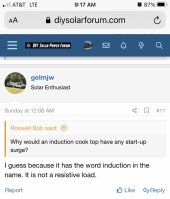chadmichael
New Member
- Joined
- Feb 26, 2022
- Messages
- 56
I'm building a 400 watt system for a van, pretty much following Will's recipe for that system. Ill have a 2200 watt inverter and I plan to attempt to use a induction cooktop with it. That cooktop is rated at 1800 watts and I know that it would require a much larger inverter due to the fact that its maximum draw is going to be higher than the 2200 Watts. My hope is that I can still make use of an induction cooktop at half power. If it can still boil water at this power level, it still would be a very convenient, efficient way to boil water, etc.
If I take a trial and error approach, ie I will use the induction cooktop and see what power level my system can adequately support without blowing a fuse, do I face any dangers? or costs?
My system will have a fuse bolted on to the positive terminal of the battery and the inverter will directly attach to that. I have calculated that this fuse will be 230 to 250 amps.
If I pull too hard on the inverter, by turning the induction cooktop up too high, what are my consequences? Is it as simply as blowing the main fuse? Is it then just the hassle of replacing that fuse? If that were the case, could I put a breaker there too take the "cost" out of my period of learning proper level for using the cooktop?
If I take a trial and error approach, ie I will use the induction cooktop and see what power level my system can adequately support without blowing a fuse, do I face any dangers? or costs?
My system will have a fuse bolted on to the positive terminal of the battery and the inverter will directly attach to that. I have calculated that this fuse will be 230 to 250 amps.
If I pull too hard on the inverter, by turning the induction cooktop up too high, what are my consequences? Is it as simply as blowing the main fuse? Is it then just the hassle of replacing that fuse? If that were the case, could I put a breaker there too take the "cost" out of my period of learning proper level for using the cooktop?



